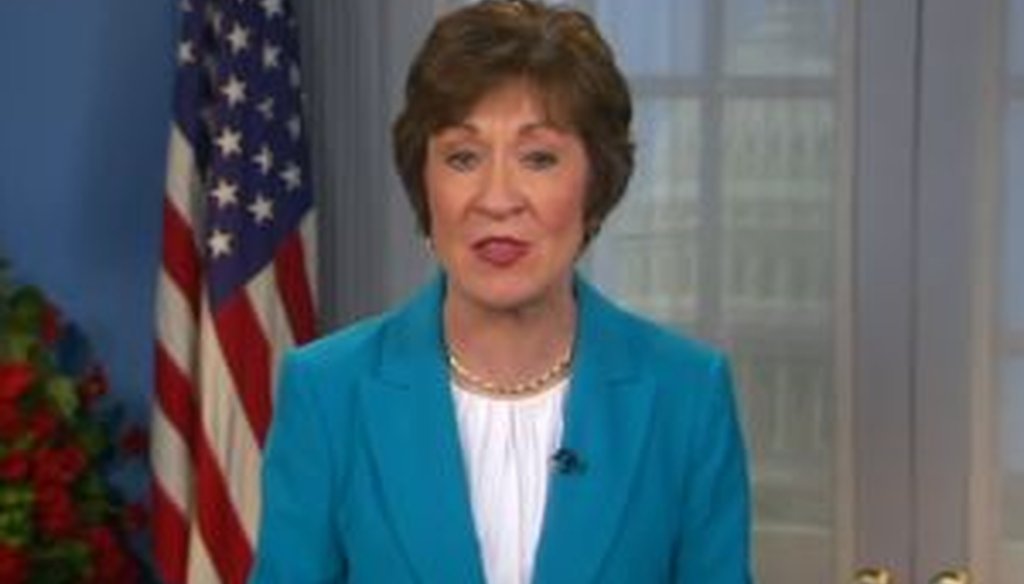

Our only agenda is to publish the truth so you can be an informed participant in democracy.
We need your help.


Sen. Susan Collins, R-Maine, said that most jobs created this year have been part-time positions. Is she correct?
Policymakers and pundits are spending a lot of time these days talking about part-time jobs -- whether they are becoming more common at the expense of full-time jobs, and how problematic that trend could be.
Republicans note that President Barack Obama’s health care law requires larger employers to provide health insurance to their workers, which they say gives companies an incentive to cut workers’ hours so much that they become part-time workers and thus exempt from the health insurance mandate.
And beyond the question of Obamacare’s incentives, some economists worry that since the most recent recession, companies have been unusually willing to hire part-time workers rather than full-time workers.
We recently noticed two seemingly contradictory comments on this topic -- one from a Republican, one from a Democrat -- and thought it would be worthwhile checking both.
In this item, we will check a claim made by Sen. Susan Collins, R-Maine, in a response to one of Obama’s Saturday radio addresses.
"In the past, most new jobs were full time, but, this year, the overwhelming majority of new jobs are part time," Collins said. "Under this troubling trend, more workers will find their hours and their earnings reduced. Jobs will be lost. This is especially disturbing as our country is still battling high unemployment."
The other comment we will check separately is by Alan Krueger, the chairman of Obama’s Council of Economic Advisers: "Since the Affordable Care Act passed, 90 percent of job growth has been in full-time positions."
These two comments paint sharply different pictures, so we turned to data from the Bureau of Labor Statistics.
For Collins, we looked at the change in full-time and part-time employment between December 2012 and July 2013, then determined which of the two types of employment accounted for a larger share of the increase in overall employment. Here’s the summary:
Date
Full-time employees
Part-time employees
December 2012
115,868,000
27,502,000
July 2013
116,090,000
28,233,000
Change, Dec-July
+222,000
+731,000
So Collins has a point -- 77 percent of the increase in employment over this period came from part-time jobs. We think a 3-to-1 ratio qualifies as "overwhelming."
Still, we will offer a few caveats.
• A large majority of these jobs are being taken by people who want to work part time. BLS breaks part-time jobs into two categories -- people working part-time for economic reasons (meaning they want a full-time job, but have to settle for a part-time job), and people working part-time for noneconomic reasons (because they prefer a part-time schedule to a full-time schedule).
Date
Part time for economic reasons
Part time for noneconomic reasons
Dec. 2012
7,918,000
18,763,000
July 2013
8,245,000
19,128,000
In other words, about 70 percent of people working part time right now are doing so because they want to work part time, not because the economy is forcing them to.
This doesn’t mean there are no problems associated with a rise in part-time jobs -- such a shift could make it harder for the recovery to gain momentum, said Tara Sinclair, a George Washington University economist. Still, it’s important to point out that most people taking part-time jobs aren’t being forced into those jobs purely because of the economy.
• Timing matters. If you use a longer time horizon, a large percentage of jobs created were full-time positions. "Over longer periods, a much smaller percentage of job gains have taken the form of part-time jobs," said Gary Burtless, an economist with the Brookings Institution.
In other words, by choosing the time frame carefully, you can find support for either side of this argument.
Our ruling
Collins said, "This year, the overwhelming majority of new jobs are part time." The statistics show that 77 percent of the increase in jobs between December 2012 and July 2013 consisted of part-time jobs. It’s worth noting that longer time frames show the opposite pattern, and that most of the part-time jobs being created are being taken by people who actually want to work part time. Still, on the numbers, Collins is right, and we rate her claim True.
Susan Collins, Republican response to President Barack Obama's Weekly radio address, Aug. 3, 2013
Bureau of Labor Statistics, "Table A-6. Employed and unemployed full- and part-time workers by sex and age, seasonally adjusted," accessed Aug. 6, 2013
Bureau of Labor Statistics, Employment Situation News Release, April 5, 2013
Bureau of Labor Statistics, "Table A-8. Employed persons by class of worker and part-time status," Aug. 2, 2013
Bureau of Labor Statistics, Employment Situation News Release, June 4, 2010
Email interview with Gary Burtless, senior fellow at the Brookings Institution, Aug. 5, 2013
Email interview with Tara Sinclair, economist at George Washington University, Aug. 5, 2013
Email interview with Francis Horvath, Office of Employment and Unemployment Statistics at the Bureau of Labor Statistics, Aug. 5, 2013
Email interview with Kevin Kelley, spokesman for Susan Collins, Aug. 5, 2013
In a world of wild talk and fake news, help us stand up for the facts.
